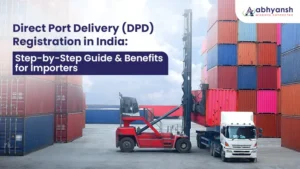India’s logistics industry plays a crucial role in driving economic growth and facilitating seamless trade. Abhyansh Shipping, as a company, acknowledges the significant strides made by the Indian government through the implementation of the National Logistics Policy (NLP). The NLP, announced in September 2022, marks a milestone in recognizing the importance of logistics and supply chain in India’s overall development. In this article, we explore how this policy is set to transform the shipping and logistics industry, attract global investments, and propel India towards becoming a global logistics hub.
Enhancing Infrastructure and Services:
The NLP focuses on improving critical infrastructure, including roads, railways, waterways, airports, and logistic hubs. This comprehensive approach recognizes the need for robust logistics networks to support efficient transportation and supply chain operations. By investing in enhancing infrastructure and leveraging digital services, the policy aims to streamline logistics processes, reduce costs, and enhance service quality. The result will be a logistics ecosystem that promotes efficiency, reliability, and competitiveness.
Competing on the Global Stage:
India’s ambition to become the third-largest economy necessitates positioning itself as a formidable competitor in the global market. The NLP aligns with this vision by creating an enabling environment for logistics and supply chain operations. With streamlined processes, improved infrastructure, and digital integration, India can enhance its competitiveness and challenge global leaders like China and the USA. This policy aims to position India as a preferred logistics destination, attracting foreign investments and fostering economic growth.
Boosting Economic Sectors:
The implementation of the NLP will have a direct positive impact on India’s primary and secondary sectors. By improving logistics services, supply chains of manufacturing companies operating in India will be bolstered. This will result in enhanced efficiency, reduced costs, and increased productivity. The policy’s holistic approach is in line with India’s mission of achieving self-reliance and driving domestic production. As logistics operations become more streamlined and efficient, the nation will witness the emergence of some of the best logistics companies in India.
Collaborative Approach:
To ensure effective policy implementation, industry stakeholders have a crucial role to play. As a leading player in the logistics industry, we welcome the government’s invitation for collaboration and participation in shaping the policy landscape. By providing insights and suggestions on the requirements of manufacturing companies, we can contribute to attracting more foreign investments. This collaborative approach will foster a favorable business environment, stimulate growth, and create new opportunities for the shipping and logistics industry.
Conclusion:
The National Logistics Policy marks a significant milestone in India’s journey towards becoming a global logistics powerhouse. By focusing on infrastructure development, streamlining processes, and fostering collaboration, the policy aims to enhance the efficiency and competitiveness of the logistics sector. As we celebrate the National Logistics Day, let us recognize the transformative potential of the NLP and its ability to drive economic growth, attract investments, and position India as a leading logistics destination. Together, we can build a vibrant and resilient logistics ecosystem that powers India’s progress and contributes to its global standing.






